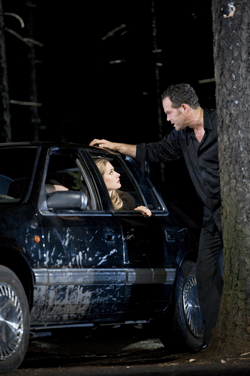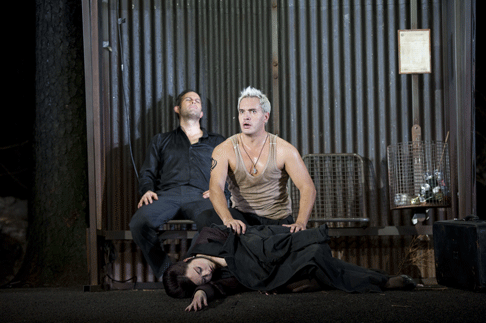29 Aug 2011
Don Giovanni, Salzburg
When discussing the evolution of opera as a genre, the towering figure of Richard Wagner cannot be ignored.

When discussing the evolution of opera as a genre, the towering figure of Richard Wagner cannot be ignored.
His radical conception of the connection between opera and philosophy is seen all throughout his work; this is especially clear in his four part Ring cycle. In the popular imagination, the Ring cycle has become the most recognizable multi-part operatic work. This is why this year’s Salzburg Festival’s presentation of all three of Mozart’s Da Ponte operas as a continuous trilogy is eyebrow-raising. Although it may seem strange on paper, Claus Guth’s choice to present these operas (Le nozze di Figaro, Don Giovanni, and Così fan tutte) as a continuous statement on the dark side of human nature makes sense. However, during the transition from creative concept to stageds production, something went awry. As a result, this production was a potpourri of fleeting inspirations.
Guth’s conception of the trilogy is to be commended for stagings of reasonable merit. His production of Così fan tutte used elements from both Figaro and Don Giovanni to present the libretto as if it were a social experiment gone wrong. His stage pictures illustrated the deteriorating relationships between the characters as well as the evil inherent in Don Alfonso’s scheme. On the whole, this gave refreshing depth to Così. The problem however, is Guth’s staging of Don Giovanni only hints at its place in the trilogy as a bridge between the mostly safe world of Figaro to the tumultuous world of Così.
 Malin Byström as Donna Anna and Gerald Finley as Don Giovanni
Malin Byström as Donna Anna and Gerald Finley as Don Giovanni
Don Giovanni occupies a unique place in the Da Ponte trilogy. Unlike Figaro where the potential for evil is never fully in the foreground, Giovanni is evil personified. While ultimately, Giovanni is vanquished by death, the characters of Così are forced to confront their own imperfections. If Guth wanted to view the three operas as an evil trilogy, this is the direction he should have taken. Instead, he took liberties with the libretto of Don Giovanni that ultimately caused some confusion with character development as well as with the progression of the drama.
As Giovanni, Gerald Finley gave a searing performance which carries on the mantle of Sir Thomas Allen. What would have been an otherwise electric performance, was hindered by Guth’s decision to have Giovanni “fatally” wounded at the outset; limiting his ability to inhabit the strong body of the slimy villain . This gives rise to another more unfortunate question: if Don Giovanni is so near death, what makes him a force to be reckoned with? This also left me with mixed emotions regarding the character. Take for example, “Fin ch’han dal vino”, whereby Finley poured a can of beer over himself and then proceeded to shake like a ferocious wet dog. This was scary to watch. Needless to say, his singing enhanced his actions. Yet at the end of the aria, he collapsed to the floor. The message here is unclear. It would have been better if he ended the aria with the typical maniacal laugh.
As Donna Anna, Malin Byström sang in the big-voiced tradition of Sharon Sweet. The most interesting facet of her performance was her rendition of “Or sai chi l’onore”. Here Donna Anna became someone who was exposed and vulnerable due to the murder of her father, as opposed to the more typical strong woman who screams at her fiancé in order to avenge this death. However, in this production, Donna Anna played into another flaw: Giovanni’s attempted rape of Donna Anna which normally begins the opera was portrayed as a consensual affair. Under this circumstance the whole rasion d’etre of the rage of Donna Anna and the villainy of Giovanni remain unsubstantiated. Despite the opera’s tragic elements, this is still an opera buffa. A key feature of opera buffa is the unflattering portrayal of the aristocracy. In this production, the aristocracy, which is symbolized by Don Giovanni, does not experience the ridicule to the same degree as there is a deficiency of the villainy Don Giovanni.
 Gerald Finley as Don Giovanni, Dorothea Röschmann as Donna Elvira and Erwin Schrott as Leporello
Gerald Finley as Don Giovanni, Dorothea Röschmann as Donna Elvira and Erwin Schrott as Leporello
Dorothea Röschmann, as Donna Elvira, sang powerfully, giving an excellent case for Donna Elvira as a tragic heroine, which was strengthened in synergy by Byström’s portrayal of Donna Anna as a weak character. Christiane Karg was a girlish Zerlina who could also show great concern and substantial depth of character as necessary. Adam Plachetka, as Masetto, made it clear that he understood the evil Giovanni from the very beginning. Both Don Ottavio and Leporello, played by Joel Priesto and Adrian Sâmpetrean, respectively were admirably sung.
Under the direction of Yannick Nézet-Séguin, the Vienna Philharmonic made a fine case for the symphonic capabilities of Mozart’s score. However, his tempos were slow at the beginning, and the numerous florid accompaniments to the recitatives were distracting. That said, he brought a romantic expansiveness to certain pieces, including “Là ci darem la mano”.
It remains to be said that some of the humor of the production diminished the overall dramatic effect. The humor of Mozart’s tragic comedy should arise from situations that are detailed in the libretto, not from the staging. There were several instances, such as Giovanni taunting Zerlina and Masetto while on a swing, that were humorous, while at the same time illustrating the Don’s capacity for villainy. Yet, other gags consisted of elaborate stage movements that were difficult to follow and at times disrupted the flow of the drama. The imbalance produced by these attempts at comedy was symbolic of the overall effect of Guth’s production. In this adaptation, there were moments of inspiration that were somehow lost.
Gregory Moomjy